WASHINGTON -- Senate Republicans filibustered another one of
President Barack Obama's nominees on Tuesday: Nina Pillard, a Georgetown
University law professor and a noncontroversial nominee to the D.C.
Circuit Court of Appeals.
The Senate voted 56 to 41 on a procedural motion for Pillard, falling short of the 60 votes needed to bring her confirmation vote to the floor. Only two Republicans, Sens. Lisa Murkowski (Alaska) and Susan Collins (Maine), sided with Democrats to let her proceed.
Republicans readily admit their opposition to Pillard isn't about her. In fact, they don't really have a problem with any of Obama's picks for the D.C. Circuit, the second most powerful court in the nation. They just don't want him to fill its three vacancies. Many of them say the court isn't busy enough to warrant filling its empty seats; others make the counterintuitive argument that Obama is "court-packing" by filling routine vacancies. But both of those arguments gloss over the fact that the president, any president, has a constitutional duty to fill empty court seats, and barring extraordinary circumstances, the Senate is supposed to give nominees a vote.
Pillard's filibuster is the latest example of how the Senate isn't holding to that standard anymore. Not only is she the third noncontroversial nominee that Republicans have filibustered in the last two weeks, but she is now the 20th Obama nominee who is either currently being blocked or was blocked and ultimately withdrew from the process. Those blockages cause a logjam that reverberates through the judiciary and the executive branch, as positions have gone unfilled at crisis levels dating back to 2007.
The Huffington Post crunched some data and found that, as of Tuesday, 13 judicial nominees have been returned to Obama and were not renominated or withdrew their nominations, four judicial nominees aren't moving because GOP senators won't let them advance in the Senate Judiciary Committee, and three other nominees (two judicial, one executive) were recently filibustered for reasons that had nothing to do with their qualifications.
The diversity of the group is hard to overlook. Ten of the sidelined judicial nominees are women, two are openly gay and nine are minorities (seven are African American, one is Asian American and one is Native American). The lone executive nominee being blocked right now, Rep. Mel Watt (D-N.C.), is African American.
Democrats have noted that Republicans keep filibustering female nominees to the D.C. Circuit. Sen. Tim Kaine (D-Va.) wondered aloud on the Senate floor "whether there is a double standard" when it comes to putting women on that court. Before Pillard, Republicans also blocked Patricia Millett and Caitlin Halligan.
"Caitlin Halligan, who practiced before the U.S. Supreme Court, was the Solicitor General for the State of New York, why block her? Why block Patty Millett, who worked in the Solicitor General's office under both administrations?" Kaine asked Thursday. "Why block Nina Pillard? Nina Pillard was the appellate attorney before the United States Supreme Court to argue for the need to admit women students to the Virginia Military Institute."
"Another woman filibustered ... another woman stopped in her tracks," Sen. Amy Klobuchar (D-Minn.) said after Millett's blocked vote. "This has to end. We've been making so much progress for women in the judicial system."
Members of the Congressional Black Caucus, meanwhile, are fuming about Republicans blocking Watt's confirmation to head the Federal Housing Finance Agency. They note that the filibuster of Watt, an 11-term congressman, marks the first time the Senate has denied a Cabinet post to a sitting member of Congress since 1843.
“What happened today has only occurred once in the history of this Congress,” Rep. Marcia Fudge (D-Ohio), chairwoman of the caucus, said after Watt was blocked. “This is a disgrace to this body and a disservice to the American people.”
Senate Republicans have taken offense at the suggestion that they're blocking nominees for being women or minorities.
"When [Democrats] run out of legitimate arguments, their last line of defense is to accuse Republicans of opposing nominees based upon gender or race. It's an old and it's a well-worn card," Sen. Chuck Grassley (R-Iowa) said Tuesday. "Those types of attacks are beneath this institution."
Here's a look at Obama's 20 nominees who are still waiting for a confirmation vote, or who gave up waiting and pulled out of the process entirely.
NOMINEES CURRENTLY BEING BLOCKED
Nina Pillard, nominee to the D.C. Circuit Court of Appeals

Obama nominated Pillard, a Georgetown University law professor, in June 2013. She was confirmed by the Senate Judiciary Committee in September 2013, in a party-line vote. Republicans filibustered her confirmation vote on Nov. 12. Senate Majority Leader Harry Reid (D-Nev.) has vowed to bring her vote back to the floor.
Patricia Millett, nominee to the D.C. Circuit Court of Appeals
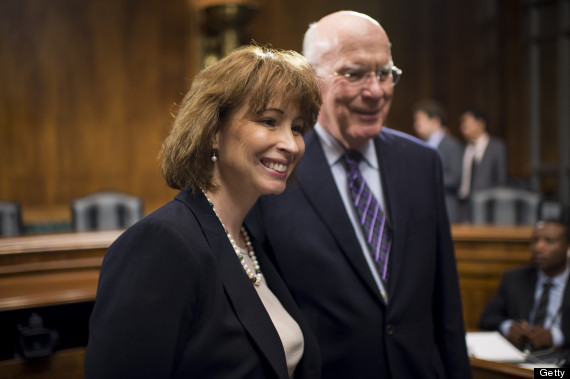
Obama nominated Millett, a top Supreme Court appellate lawyer, in June 2013. She was confirmed by the Senate Judiciary Committee in August 2013, in a party-line vote. Republicans filibustered her confirmation vote on Oct. 31. Reid has vowed to bring her vote back to the floor.
Mel Watt, nominee to lead the Federal Housing Finance Agency
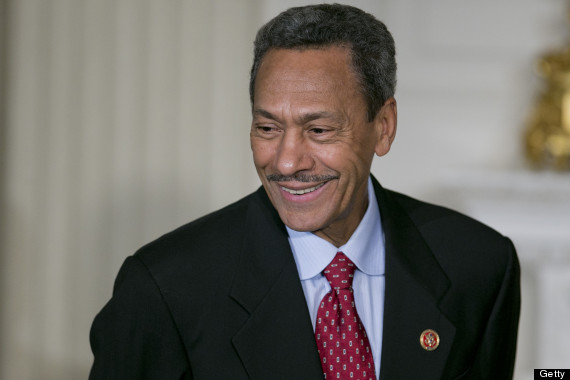
Obama nominated Watt, an 11-term congressman, in May 2013. Republicans filibustered his confirmation vote on Oct. 31. Reid has vowed to bring his vote back to the floor.
Jill Pryor, nominee to the U.S. Court of Appeals for the Eleventh Circuit

Obama nominated Pryor, a Georgia attorney, in February 2012. Both of her home state senators, Republicans Johnny Isakson and Saxby Chambliss, have refused to sign off on her nomination and allow the Senate Judiciary Committee to give her a hearing, as is custom. She is still pending before the committee.
William Thomas, nominee to the U.S. District Court for the Southern District of Florida

Obama nominated Thomas, a judge for Florida's 11th Judicial Circuit, in November 2012. His Republican home state senator, Marco Rubio, said in September 2013 that he will block Thomas from getting a hearing, even though he recommended him for the post in the first place. If confirmed, Thomas would be the first openly gay black male federal judge.
Alison Lee, nominee to the U.S. District Court for the District of South Carolina
Obama nominated Lee, a judge in the Fifth Judicial Circuit, in June 2013. Both of her home state senators, Republicans Lindsey Graham and Tim Scott, have cited "concerns" about her nomination, but have given no details. She is currently pending before the Senate Judiciary Committee.
Jennifer May-Parker, nominee to the U.S. District Court for the Eastern District of North Carolina
May-Parker, the chief of the appellate division of the U.S. Attorney's Office in the Eastern District of North Carolina, was nominated in June 2013. Her Republican home state senator, Richard Burr, is preventing her from getting a hearing before the Senate Judiciary Committee. If confirmed, May-Parker would fill the longest standing district court vacancy in the country.
NOMINEES RETURNED AND NOT RE-NOMINATED, OR WITHDRAWN
Victoria Nourse, nominee to the Seventh Circuit Court of Appeals

Obama nominated Nourse, a University of Wisconsin law professor, in July 2010. Sen. Ron Johnson (R-Wis.) blocked her vote in committee, however, and in January 2012, Nourse asked Obama to withdraw her nomination. She later told a colleague of the experience, "The system is broken."
Stephen Six, nominee to the Tenth Circuit Court of Appeals

Obama nominated Six, a former Kansas attorney general, in March 2011. His two home state senators, Republicans Jerry Moran and Pat Roberts, blocked his nomination from moving in the Senate Judiciary Committee. His nomination was returned to the president in December 2011, and he was not renominated.
Michael Charles Green, nominee to the U.S. District Court for the Western District of New York
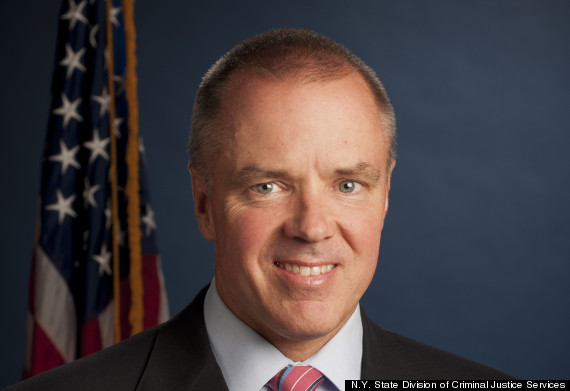
Green, who was the District Attorney for Monroe County, N.Y. at the time, was nominated in January 2011. The Senate Judiciary Committee voted to progress his nomination in June 2011, but he didn't move after that. His nomination was returned to Obama in December 2011, and he was not renominated.
Arvo Mikkanen, nominee to the U.S. District Court for the Northern District of Oklahoma
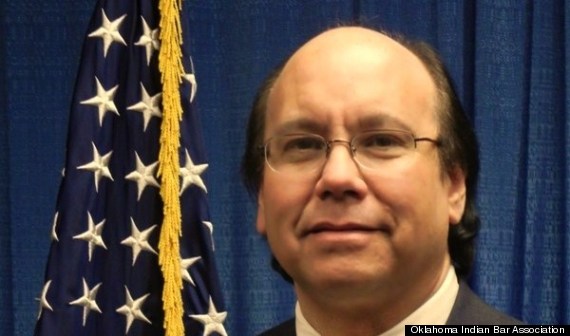
Obama nominated Mikkanen, an attorney in the Office of the U.S. Attorney for the Western District of Oklahoma, in February 2011. He was rated "unanimously qualified" by the American Bar Association. His two home state senators, Republicans Tom Coburn and Jim Inhofe, blocked his nomination from moving in the Senate Judiciary Committee. His nomination was returned to Obama in December 2011, and he was not renominated.
Natasha Silas, nominee to the U.S. District Court for the Northern District of Georgia

The president nominated Silas, a staff attorney at the Federal Defender Program for the Northern District of Georgia, in January 2011. Her two home state senators, Republicans Johnny Isakson and Saxby Chambliss, blocked her nomination from moving in the Senate Judiciary Committee. Her nomination expired in December 2011 and it was not resubmitted.
Louis Butler, nominee to the U.S. District Court for the Western District of Wisconsin
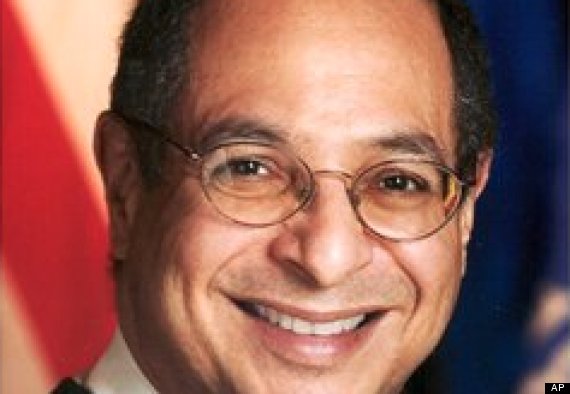
Obama nominated Butler, who was the first African American to serve on the Wisconsin Supreme Court, in September 2009. Sen. Ron Johnson (R-Wis.) put a hold on Butler's nomination, which prevented him from moving in the Senate Judiciary Committee. His nomination was eventually returned to the president in December 2011, and he was not renominated.
Linda Walker, nominee to the U.S. District Court for the Northern District of Georgia
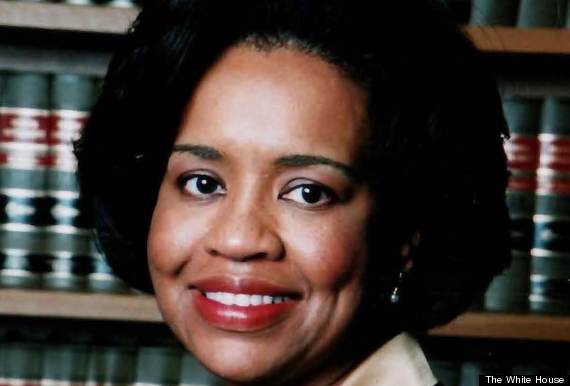
Walker was nominated in January 2011; she was already a magistrate judge on that court. She was paired with Silas as part of a package deal on nominees. Republican Sens. Johnny Isakson and Saxby Chambliss supported Walker getting a Senate Judiciary Committee hearing, but did not support Silas, so neither moved. Walker's nomination was returned to the president in December 2011 and was not resubmitted.
Goodwin Liu, nominee to the U.S. Court of Appeals for the Ninth Circuit
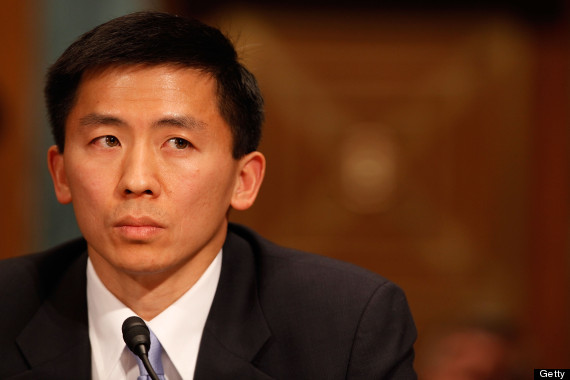
Obama nominated Liu, who was the associate dean of the UC Berkeley School of Law at the time, in February 2010. His nomination languished for over a year, and in May 2011, Republicans filibustered his confirmation vote. Later that month, Liu withdrew his name from consideration. He told Obama, "with no possibility of an up-or-down vote on the horizon, my family and I have decided that it is time for us to regain the ability to make plans for the future." He went on to become a justice on the California Supreme Court.
Caitlin Halligan, nominee to the D.C. Circuit Court of Appeals
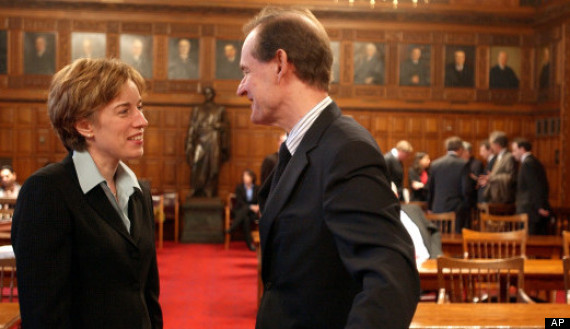
The president nominated Halligan, the Solicitor General for New York, in September 2010. Republicans filibustered her in December 2011. Obama renominated her in June 2012, but her nomination was sent back to him August 2012 when Republicans refused to hold over her nomination during the Senate's summer recess. The president renominated Halligan for the third time in September 2012, but her nomination never went anywhere. Obama officially withdrew her nomination in March 2013.
Robert Chatigny, nominee to the Second Circuit Court of Appeals Chatigny, a federal district judge in Connecticut, was nominated in February 2010. His nomination received a unanimous rating of "well qualified" from the American Bar Association, and in June 2010, he cleared the Senate Judiciary Committee in a party-line vote. He never got a Senate vote and his nomination was returned to Obama at the end of the 111th Congress. Per Chatigny's request, he was not renominated.
Edward DuMont, nominee to the U.S. Court of Appeals for the Federal Circuit
Obama nominated DuMont, a partner with the law firm WilmerHale, in April 2010. DuMont's nomination went nowhere for 18 months as Grassley, the ranking Republican on the Senate Judiciary Committee, held up his vote. In November 2011, DuMont asked Obama to withdraw his name, indicating that GOP senators were refusing to let him get a committee hearing. If confirmed, DuMont would have been the first openly gay U.S. appeals court judge.
Charles Bernard Day, nominee to the U.S. District Court for the District of Maryland
Day, a magistrate judge in Maryland, was nominated in July 2010. Obama withdrew the nomination in October 2011 after it went nowhere for more than a year. Day's home state senators, Democrats Barbara Mikulski and Ben Cardin, said Republicans were behind Day not getting a Senate Judiciary Committee hearing.
Elissa Cadish, nominee to the U.S. District Court for the District of Nevada Obama nominated Cadish, a judge on the Nevada Eighth Judicial District Court, in February 2012. She was rated "unanimously qualified" by the American Bar Association. Her Republican home state senator, Dean Heller, prevented her from getting a hearing before the Senate Judiciary Committee. In March 2013, Cadish requested that Obama withdraw her name from consideration.
Original Article
Source: huffingtonpost.com
Author: Jennifer Bendery
The Senate voted 56 to 41 on a procedural motion for Pillard, falling short of the 60 votes needed to bring her confirmation vote to the floor. Only two Republicans, Sens. Lisa Murkowski (Alaska) and Susan Collins (Maine), sided with Democrats to let her proceed.
Republicans readily admit their opposition to Pillard isn't about her. In fact, they don't really have a problem with any of Obama's picks for the D.C. Circuit, the second most powerful court in the nation. They just don't want him to fill its three vacancies. Many of them say the court isn't busy enough to warrant filling its empty seats; others make the counterintuitive argument that Obama is "court-packing" by filling routine vacancies. But both of those arguments gloss over the fact that the president, any president, has a constitutional duty to fill empty court seats, and barring extraordinary circumstances, the Senate is supposed to give nominees a vote.
Pillard's filibuster is the latest example of how the Senate isn't holding to that standard anymore. Not only is she the third noncontroversial nominee that Republicans have filibustered in the last two weeks, but she is now the 20th Obama nominee who is either currently being blocked or was blocked and ultimately withdrew from the process. Those blockages cause a logjam that reverberates through the judiciary and the executive branch, as positions have gone unfilled at crisis levels dating back to 2007.
The Huffington Post crunched some data and found that, as of Tuesday, 13 judicial nominees have been returned to Obama and were not renominated or withdrew their nominations, four judicial nominees aren't moving because GOP senators won't let them advance in the Senate Judiciary Committee, and three other nominees (two judicial, one executive) were recently filibustered for reasons that had nothing to do with their qualifications.
The diversity of the group is hard to overlook. Ten of the sidelined judicial nominees are women, two are openly gay and nine are minorities (seven are African American, one is Asian American and one is Native American). The lone executive nominee being blocked right now, Rep. Mel Watt (D-N.C.), is African American.
Democrats have noted that Republicans keep filibustering female nominees to the D.C. Circuit. Sen. Tim Kaine (D-Va.) wondered aloud on the Senate floor "whether there is a double standard" when it comes to putting women on that court. Before Pillard, Republicans also blocked Patricia Millett and Caitlin Halligan.
"Caitlin Halligan, who practiced before the U.S. Supreme Court, was the Solicitor General for the State of New York, why block her? Why block Patty Millett, who worked in the Solicitor General's office under both administrations?" Kaine asked Thursday. "Why block Nina Pillard? Nina Pillard was the appellate attorney before the United States Supreme Court to argue for the need to admit women students to the Virginia Military Institute."
"Another woman filibustered ... another woman stopped in her tracks," Sen. Amy Klobuchar (D-Minn.) said after Millett's blocked vote. "This has to end. We've been making so much progress for women in the judicial system."
Members of the Congressional Black Caucus, meanwhile, are fuming about Republicans blocking Watt's confirmation to head the Federal Housing Finance Agency. They note that the filibuster of Watt, an 11-term congressman, marks the first time the Senate has denied a Cabinet post to a sitting member of Congress since 1843.
“What happened today has only occurred once in the history of this Congress,” Rep. Marcia Fudge (D-Ohio), chairwoman of the caucus, said after Watt was blocked. “This is a disgrace to this body and a disservice to the American people.”
Senate Republicans have taken offense at the suggestion that they're blocking nominees for being women or minorities.
"When [Democrats] run out of legitimate arguments, their last line of defense is to accuse Republicans of opposing nominees based upon gender or race. It's an old and it's a well-worn card," Sen. Chuck Grassley (R-Iowa) said Tuesday. "Those types of attacks are beneath this institution."
Here's a look at Obama's 20 nominees who are still waiting for a confirmation vote, or who gave up waiting and pulled out of the process entirely.
NOMINEES CURRENTLY BEING BLOCKED
Nina Pillard, nominee to the D.C. Circuit Court of Appeals

Obama nominated Pillard, a Georgetown University law professor, in June 2013. She was confirmed by the Senate Judiciary Committee in September 2013, in a party-line vote. Republicans filibustered her confirmation vote on Nov. 12. Senate Majority Leader Harry Reid (D-Nev.) has vowed to bring her vote back to the floor.
Patricia Millett, nominee to the D.C. Circuit Court of Appeals

Obama nominated Millett, a top Supreme Court appellate lawyer, in June 2013. She was confirmed by the Senate Judiciary Committee in August 2013, in a party-line vote. Republicans filibustered her confirmation vote on Oct. 31. Reid has vowed to bring her vote back to the floor.
Mel Watt, nominee to lead the Federal Housing Finance Agency

Obama nominated Watt, an 11-term congressman, in May 2013. Republicans filibustered his confirmation vote on Oct. 31. Reid has vowed to bring his vote back to the floor.
Jill Pryor, nominee to the U.S. Court of Appeals for the Eleventh Circuit

Obama nominated Pryor, a Georgia attorney, in February 2012. Both of her home state senators, Republicans Johnny Isakson and Saxby Chambliss, have refused to sign off on her nomination and allow the Senate Judiciary Committee to give her a hearing, as is custom. She is still pending before the committee.
William Thomas, nominee to the U.S. District Court for the Southern District of Florida

Obama nominated Thomas, a judge for Florida's 11th Judicial Circuit, in November 2012. His Republican home state senator, Marco Rubio, said in September 2013 that he will block Thomas from getting a hearing, even though he recommended him for the post in the first place. If confirmed, Thomas would be the first openly gay black male federal judge.
Alison Lee, nominee to the U.S. District Court for the District of South Carolina
Obama nominated Lee, a judge in the Fifth Judicial Circuit, in June 2013. Both of her home state senators, Republicans Lindsey Graham and Tim Scott, have cited "concerns" about her nomination, but have given no details. She is currently pending before the Senate Judiciary Committee.
Jennifer May-Parker, nominee to the U.S. District Court for the Eastern District of North Carolina
May-Parker, the chief of the appellate division of the U.S. Attorney's Office in the Eastern District of North Carolina, was nominated in June 2013. Her Republican home state senator, Richard Burr, is preventing her from getting a hearing before the Senate Judiciary Committee. If confirmed, May-Parker would fill the longest standing district court vacancy in the country.
NOMINEES RETURNED AND NOT RE-NOMINATED, OR WITHDRAWN
Victoria Nourse, nominee to the Seventh Circuit Court of Appeals

Obama nominated Nourse, a University of Wisconsin law professor, in July 2010. Sen. Ron Johnson (R-Wis.) blocked her vote in committee, however, and in January 2012, Nourse asked Obama to withdraw her nomination. She later told a colleague of the experience, "The system is broken."
Stephen Six, nominee to the Tenth Circuit Court of Appeals

Obama nominated Six, a former Kansas attorney general, in March 2011. His two home state senators, Republicans Jerry Moran and Pat Roberts, blocked his nomination from moving in the Senate Judiciary Committee. His nomination was returned to the president in December 2011, and he was not renominated.
Michael Charles Green, nominee to the U.S. District Court for the Western District of New York

Green, who was the District Attorney for Monroe County, N.Y. at the time, was nominated in January 2011. The Senate Judiciary Committee voted to progress his nomination in June 2011, but he didn't move after that. His nomination was returned to Obama in December 2011, and he was not renominated.
Arvo Mikkanen, nominee to the U.S. District Court for the Northern District of Oklahoma

Obama nominated Mikkanen, an attorney in the Office of the U.S. Attorney for the Western District of Oklahoma, in February 2011. He was rated "unanimously qualified" by the American Bar Association. His two home state senators, Republicans Tom Coburn and Jim Inhofe, blocked his nomination from moving in the Senate Judiciary Committee. His nomination was returned to Obama in December 2011, and he was not renominated.
Natasha Silas, nominee to the U.S. District Court for the Northern District of Georgia

The president nominated Silas, a staff attorney at the Federal Defender Program for the Northern District of Georgia, in January 2011. Her two home state senators, Republicans Johnny Isakson and Saxby Chambliss, blocked her nomination from moving in the Senate Judiciary Committee. Her nomination expired in December 2011 and it was not resubmitted.
Louis Butler, nominee to the U.S. District Court for the Western District of Wisconsin

Obama nominated Butler, who was the first African American to serve on the Wisconsin Supreme Court, in September 2009. Sen. Ron Johnson (R-Wis.) put a hold on Butler's nomination, which prevented him from moving in the Senate Judiciary Committee. His nomination was eventually returned to the president in December 2011, and he was not renominated.
Linda Walker, nominee to the U.S. District Court for the Northern District of Georgia

Walker was nominated in January 2011; she was already a magistrate judge on that court. She was paired with Silas as part of a package deal on nominees. Republican Sens. Johnny Isakson and Saxby Chambliss supported Walker getting a Senate Judiciary Committee hearing, but did not support Silas, so neither moved. Walker's nomination was returned to the president in December 2011 and was not resubmitted.
Goodwin Liu, nominee to the U.S. Court of Appeals for the Ninth Circuit

Obama nominated Liu, who was the associate dean of the UC Berkeley School of Law at the time, in February 2010. His nomination languished for over a year, and in May 2011, Republicans filibustered his confirmation vote. Later that month, Liu withdrew his name from consideration. He told Obama, "with no possibility of an up-or-down vote on the horizon, my family and I have decided that it is time for us to regain the ability to make plans for the future." He went on to become a justice on the California Supreme Court.
Caitlin Halligan, nominee to the D.C. Circuit Court of Appeals

The president nominated Halligan, the Solicitor General for New York, in September 2010. Republicans filibustered her in December 2011. Obama renominated her in June 2012, but her nomination was sent back to him August 2012 when Republicans refused to hold over her nomination during the Senate's summer recess. The president renominated Halligan for the third time in September 2012, but her nomination never went anywhere. Obama officially withdrew her nomination in March 2013.
Robert Chatigny, nominee to the Second Circuit Court of Appeals Chatigny, a federal district judge in Connecticut, was nominated in February 2010. His nomination received a unanimous rating of "well qualified" from the American Bar Association, and in June 2010, he cleared the Senate Judiciary Committee in a party-line vote. He never got a Senate vote and his nomination was returned to Obama at the end of the 111th Congress. Per Chatigny's request, he was not renominated.
Edward DuMont, nominee to the U.S. Court of Appeals for the Federal Circuit
Obama nominated DuMont, a partner with the law firm WilmerHale, in April 2010. DuMont's nomination went nowhere for 18 months as Grassley, the ranking Republican on the Senate Judiciary Committee, held up his vote. In November 2011, DuMont asked Obama to withdraw his name, indicating that GOP senators were refusing to let him get a committee hearing. If confirmed, DuMont would have been the first openly gay U.S. appeals court judge.
Charles Bernard Day, nominee to the U.S. District Court for the District of Maryland
Day, a magistrate judge in Maryland, was nominated in July 2010. Obama withdrew the nomination in October 2011 after it went nowhere for more than a year. Day's home state senators, Democrats Barbara Mikulski and Ben Cardin, said Republicans were behind Day not getting a Senate Judiciary Committee hearing.
Elissa Cadish, nominee to the U.S. District Court for the District of Nevada Obama nominated Cadish, a judge on the Nevada Eighth Judicial District Court, in February 2012. She was rated "unanimously qualified" by the American Bar Association. Her Republican home state senator, Dean Heller, prevented her from getting a hearing before the Senate Judiciary Committee. In March 2013, Cadish requested that Obama withdraw her name from consideration.
Original Article
Source: huffingtonpost.com
Author: Jennifer Bendery

No comments:
Post a Comment